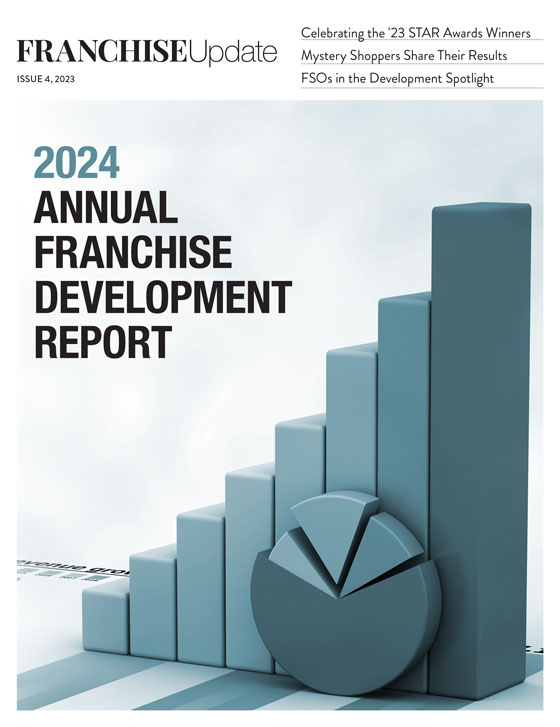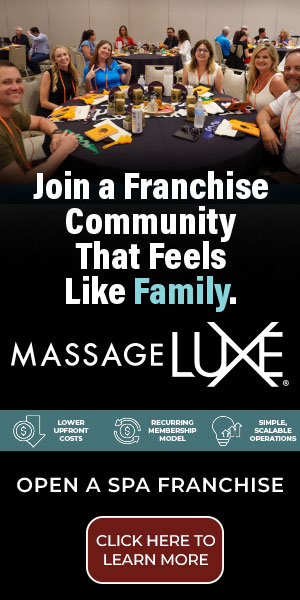Outside Expertise: Franchise Sales Organizations Fill a Unique Niche in Franchise Recruiting

Editor’s note: Deciding to use franchise brokers and franchise sales organizations (FSOs) is a complex, sometimes controversial, issue and raises a number of critical questions for franchise development executives. This is the second part of our series laying out strategies from the perspectives of franchisors, brokers, and, this time, FSOs.
When Renovation Sells CEO Michael Valente decided to venture into the unfamiliar world of franchising with his home renovation concept, he knew one thing for sure.
“I’m smart enough to know what I don’t know,” says Valente, who founded Renovation Sells in 2017 with his wife, Amanda.
Valente, who has a construction and real estate background, turned to the outside expertise of franchise sales organization BrandOne to expand his Chicago-based service brand. Within two years, Renovation Sells has grown from a single corporate location into the nation’s largest residential presale renovation company with 45 franchise locations in 23 states and growing.
Franchise sales organizations (FSOs) are in the business of growth, and business is booming for franchisors like Valente. “When we signed our first location in September of ‘21, we didn’t just sign one location; we signed four right off the bat,” Valente says.
Once considered a well-kept franchise development secret, FSOs are making their expert presence known in the industry, transforming the game for brands looking to avoid costly mistakes and expand with successful franchisees.
“We are an extension of their company. We partner together. We’re not hired guns; we’re not cowboys. We are partners in our client’s business. It makes a big difference,” says Kurt Landwehr, founder of BrandOne, when discussing the role of FSOs on the recent webinar, “Discover the Game-Changing Potential of Franchise Sales Organizations,” hosted by leading franchise management software provider FranConnect.
The role of FSOs
Franchise sales is a complicated world that involves a number of strategic choices. Navigating this increasingly competitive landscape of franchising with a sophisticated sales process is challenging, especially for franchisors who lack the resources, expertise, or network to sell their franchise brand effectively. Many can’t afford to hire a six-figure internal gunslinger to handle the process or build and manage an in-house team.
Enter FSOs. Like companies that have long provided outsourced legal or marketing services, these third-party franchise development pros specialize in selling franchise units on behalf of franchisors. They manage the heavy lifting of the mutual evaluation process between a brand and a franchise prospect. By leaving the job of selling in the hands of those who understand the nuances of the franchise model, leadership can focus on building healthy unit economics and serving current franchise owners.
“You really have to understand and flesh out what the FSO is going to do for you, what they are going to do for the brand, what that’s going to cost you, and what the expectations of growth are,” Valente says, “and then you have to measure it consistently, and constantly be in communication to make sure that your guys are moving in lockstep.”
The cost of professionally outsourcing this sales process varies by the size and growth stage of the franchisor and the range and type of tactical strategies and services the FSO provides. Services include prospect acquisition, consultant marketing, comprehensive training, and operational, financial, and legal know-how.
Most traditional FSOs charge a monthly fee to market and manage leads in addition to a commission for each franchise sold and fees for value-added services. Less frequently and more controversially, FSOs require royalty or equity stakes.
Understanding the complexity of the franchise sales process is one of the most significant benefits of using FSO professionals, who can offer guidance at every stage, including evaluating whether a brand is fit for franchising.
“Every business can be franchised; not every business should be franchised,” notes Michael Peterson, president and founder of Franchise Beacon, a full-service sales and franchise development firm. “We go through the process of a feasibility study, evaluating the ROI for the franchisor and for the franchisee and what the costs are going to be. Assuming everybody’s bought in, we get them to the franchise market.”
Think of FSOs as fractional sales teams, fractional marketers, and fractional CFOs, says Keith Gerson, president of franchise operations at FranConnect.
“FSOs are so important, particularly to those emerging brands and somewhat to the mid-market brands, because they’re going to handle all of the leads,” Gerson says. “They’re setting up the sales processes, managing the documents in many cases, and even taking care of discovery day. I think FSOs are gaining more traction because they’re going to be able to work with and generate as many as 10 to 15 or 20 deals for a franchise organization over the course of the year, depending on the brand.”
In the case of Renovation Sells, Valente credits the groundwork done before launching a franchise offering for the brand’s fast start. The company worked with BrandOne for a year, mapping out the entire franchise sales development blueprint from scratch before presenting Renovation Sells to broker networks.
The sales education process included a marketing strategy, drip campaign, video, and other forward-facing tools that highlighted differentiators of the brand, which provides renovations that help homeowners build future equity or sell faster at a higher price.
“We’re in the business of selling dreams,” Valente says. “But to properly sell that dream of becoming an owner, you have to market that dream properly, so the forward-facing marketing strategy and content are very important. You have to make sure it’s done right with all the tools that allow people to see what it’s like to become a franchisee.”
The rise of FSOs
The rise of FSOs has broadened the franchise development landscape for franchise brokers and lead generation networks, which have distinct roles as high-quality lead providers. (See related story in Q3 Franchise Update magazine.)
Each week, franchise industry veteran Red Boswell introduces franchisors to multiple FSOs with sales development expertise. Boswell, president of the membership-based franchise consulting network International Franchise Professionals Group (IFPG) and FranchiseWire, calls the relationship between FSOs and brokers a “match made in heaven.”
“FSOs bring legitimacy,” Boswell says. “The consultants trust the best FSOs and the best franchise development reps. It’s a relationship and takes time to build. The best FSOs tend to have really good processes, accountability, and full-time, dedicated franchise professionals that know how to frick and frack with the broker, take folks through a defined and clear process, and get deals done.”
The mainstream arrival of FSOs has prompted franchise broker consulting companies, like performance-based Business Alliance Inc. (BAI), to beef up their broker education.
“We’ve had training with our consultants on how to work with FSOs because they are different from working directly with a franchise company,” says Natalie Barnes, BAI president. “It’s been hard for us to determine how we vet franchises in our inventory that work with an FSO. Does an FSO know how to handle referrals? Do they know how to take a candidate through the process? Just like franchising consulting, there are some really good ones and not-so-good ones. It’s like that in the franchise world as well.”
While good franchise sales organizations have strong relationships with reputable brokers and lead generation networks, franchisors must also be aware of the commission and monthly membership costs associated with this lead flow source.
“A zor using an FSO and brokers is going to get nothing. Don’t ever expect to get a penny if you’re working with an FSO and the emphasis is working with broker groups because the FSO usually gets a good half of it, and the broker group usually gets at least half of it,” notes Boswell. “You’re in it for the royalties; you’re not in it for the money on a franchise sale.”
Clear expectations
Teaming up with a savvy, strategic growth partner who knows how to scale and create value can be an excellent move for a bright franchise future, but it’s not right for everybody.
“You have to understand what your growth plan is, what you can sustain, and what you want to do because that will determine not only which FSO you use, but if you are going to use an FSO or not,” Valente says.
Aligning your goals and culture with the right FSO and having clear expectations are critical to the success of the FSO-franchisor relationship.
“If you’re looking to get better franchisees and build a brand that’s going to be more sustainable, that’s going to have the right people, and have the respect of the brokers so you will get the leads, a good FSO will help you get there,” says Franchise Beacon’s Peterson. “Will a good FSO save you money on your startup when you first become a franchisor? Yes. During the franchise sales process? Not necessarily. We will make sure the money is directed in the right place. We’ll stop you from wasting money on some things and save you massive amounts of time. It’s definitely not a money-saving proposition; it’s a building-the-brand-right proposition.”
How brokers and FSOs differ
As pointed out in last issue’s story on brokers, understanding third parties in franchise development can be confusing for franchisors and franchisees alike, particularly with the ubiquitous and interchangeable use of “consultant” by professionals throughout the industry.
While franchise brokers and FSOs have a common goal in pursuing leads and sealing deals, their roles in franchising are as distinct as those of franchisor and franchisee:
- Brokers are high-quality lead providers.
- FSOs are outsourced franchise development.
“Franchise brokers are extremely high-quality lead providers,” says Red Boswell, president of the franchise consulting network International Franchise Professionals Group (IFPG) and FranchiseWire. “We do stay involved throughout the process with a lead to help the franchisor and the candidate move through the process efficiently and confidently. But we do not replace any steps in their franchise discovery process, nor do we replace anyone on their franchise development team, and that franchise development team might be an FSO.”
As an extension of the franchise brand, an FSO executes a significant part of the mutual evaluation process with a franchisee, freeing the franchisor to focus on enhancing operations and growing their business by keeping franchisees profitable and happy.
“Understanding the complexity of the relationship with the sales process is one of the benefits and one of the reasons we do what we do and why brokers work with us,” says Michael Peterson, president and founder of Franchise Beacon. “My first deal in 2022 was 1,485 days from the first call to the franchise agreement. We did one recently that was 55 days. Franchise sales are complicated.”
The cost to bring on these franchise development specialists varies by FSO and the scope and complexity of the services they provide. These often are negotiable based on the size of the franchisor, number of units sold, and the support level the brand requires. Traditional FSOs typically charge a monthly retainer and a commission on the sale of a franchise agreement. Others require equity stakes in exchange for value-added services or, less frequently and more controversially, royalties.
It’s essential for franchise brands to understand what FSOs are not, says Peterson. “FSOs generally are not franchise brokers, and they are not lead generators,” he says. “We are not in any way going to bring you people to buy a franchise. You, as a franchisor, are going to somehow generate those leads. We may manage that process for you, but you are writing the checks and making the decision. If you are looking for someone to help you generate leads, you need to go with a broker. It’s the one thing I think people really miss: There’s literally no overlap between us and a franchise broker.”
Aligning with the right franchise brokers and/or FSOs can result in a rewarding stream of prospects. But it’s still up to the brand and their franchise sales organization or team to turn a warm lead into a signed and sealed franchisee.
“It’s the franchisor at the end of the day that’s doing the closing,” says Keith Gerson, president of franchise operations at FranConnect. “The franchise sales organizations often are similar in that they’re doing all the work, all the heavy lifting, making the calls, and communicating the sales process all the way through. But it still requires the franchisor to approve the deal and bring them across the finish line.” Or not.
Connecting with a top-notch FSO
Like so much in franchising, teaming up with a franchise sales organization (FSO) is all about the relationship because finding the right fit is a two-way street.
The team at BrandOne, an FSO that works with 15 brands, considers their company a franchise growth organization.
“It’s really not about selling. It’s about partnering with franchisors to help them achieve their growth objectives,” says Kurt Landwehr, BrandOne’s founder and chief brand officer. “Every client is different. We have some clients whose goal is to recruit 10 to 15 new franchisees a year. We have some clients who can handle 50 to 100 new franchisees a year. It depends on each individual organization, and we get alignment around those goals.”
Landwehr’s insight was part of FranConnect’s recent roundtable webinar discussion, “Discover the Game-Changing Potential of Franchise Sales Organizations,” moderated by seasoned franchise pro Keith Gerson, president of franchise operations at FranConnect.
Franchise Update listened in on the discussion with Landwehr, who was joined on the panel by BrandOne client Michael Valente, founder and chief executive officer of Renovation Sells, and Robert Stidham, chief executive officer of Summa Franchise Consulting and the founder of the full-service franchise sales outsourcing firm, Franchise Dynamics.
Identifying a strategic growth partner that will serve as an extension of your brand requires the same type of meaningful due diligence needed to outsource other expertise, like legal and marketing services. Franchisors need to consider more than just the number of deals an FSO can close.
As a former franchisor, Landwehr shared some of what he would look for in an FSO to align around key brand objectives.
“Do we have shared values? Are these people I trust, like, and respect? Do they have a successful track record?” Landwehr says. “I would want to speak to their current and former clients to validate the things that we’re talking about and their ability to get the job done. I’d want to know about the industry relationships they could leverage on my behalf inside and outside of franchise development.”
FSOs are well suited for franchise brands with compelling Item 19s, the infrastructure to handle multi-unit opportunities, and capital for growth.
Stidham says franchisors seeking to forge a relationship with an FSO should expect the same type of thoughtful due diligence in return.
“We want to see the pilot units, what this model is built for. We want to get into your house and ask a lot of questions,” Stidham says. “We are risk-based and obviously fronting a lot of the costs and resources, and we hope to get our money back over time from sales commissions, fees, and other services we can deliver on the consulting side. There’s a risk to the FSO as well.”
Before Landwehr evaluates a concept for its financial performance, franchise offering, and unique points of differentiation, the team takes a deep industry dive.
BrandOne, which selects to associate with roughly one in every 20 companies it considers, looks for high-growth industries, under-competitive environments, and sectors that are fragmented and offer opportunities to consolidate.
A winning partnership with an FSO also requires franchisors to be willing to give up some control of their company to scale.
“Ultimately, the client has to get to a place mentally and emotionally where there’s trust, but they’re willing to give us control of the process,” Stidham says. “If the franchisor can’t get there, this doesn’t work particularly well.”
Outsourcing the time and expertise it takes to develop a franchise sales process and find, qualify, and educate candidates about Renovation Sells has allowed Valente to build the enterprise value of the brand with high-quality franchisees.
While final approval rests with the franchisor, an FSO’s ability to manage the expectations of a qualified candidate, who may be putting their life’s savings into the hands of the brand, is critical to success.
Closing in on nearly 50 locations nationwide, Renovation Sells boasts a stellar lead-to-conversation rate with one in every 15 promising prospects managed by BrandOne becoming a signed and sealed franchisee of the Chicago-based renovation company.
“I use this stat that roughly 80% of the U.S. wants to be entrepreneurs, but only 15% are,” Valente says. “When you get down to it, a lot of this is managing the fear of the candidate who wants to become an entrepreneur, so they understand what it’s really like to work for themselves, and that’s one of Kurt’s main jobs.”
The cost to accelerate growth with franchise development specialists varies by FSO and the scope and complexity of their services.
“Every project is widely different,” says Stidham, who has worked with companies of all sizes in every franchise sector. He typically includes a lead generation marketing component that provides for internal organic marketing and/or aligning with broker organizations. He charges a service fee to offset third-party costs, including technology and liability insurance. In addition, a portion of the franchise fee should be assigned to offset the acquisition costs of getting the franchise owner into business.
Weighing the financial aspect of teaming up with an FSO starts with understanding the future value of a franchisee.
“Here’s what I would tell you as a former franchisor: I would write these checks until my pen ran out of ink,” Landwehr says. “If an FSO could bring me a high-quality new franchisee that I couldn’t find on my own, and I got the lifetime value of that new franchisee to help me build my business and enterprise value, the check you have to write to the FSO pales by comparison.”
Stidham agrees and adds that the hidden value of using the know-how of an FSO is the collection of best practices left behind when the two sides part ways after goals are achieved.
“This is not expense; this is investment,” Stidham says. “When I say investment, you should anticipate putting out a definable set of resources, including marketing dollars, for an expected rate of return that manifests in franchise sales, revenue, and royalty. You have to, as a CEO or leader, make the decision that you’re willing to invest in your vision, your business, yourself, and your franchise partners for growth.”
Share this Feature
Recommended Reading:
FRANCHISE TOPICS
- Multi-Unit Franchising
- Get Started in Franchising
- Franchise Growth
- Franchise Operations
- Open New Units
- Franchise Leadership
- Franchise Marketing
- Technology
- Franchise Law
- Franchise Awards
- Franchise Rankings
- Franchise Trends
- Franchise Development
- Featured Franchise Stories
FEATURED IN

Franchise Update Magazine: Issue 4, 2023








 The franchise listed above are not related to or endorsed by Franchise Update or Franchise Update Media Group. We are not engaged in, supporting, or endorsing any specific franchise, business opportunity, company or individual. No statement in this site is to be construed as a recommendation. We encourage prospective franchise buyers to perform extensive due diligence when considering a franchise opportunity.
The franchise listed above are not related to or endorsed by Franchise Update or Franchise Update Media Group. We are not engaged in, supporting, or endorsing any specific franchise, business opportunity, company or individual. No statement in this site is to be construed as a recommendation. We encourage prospective franchise buyers to perform extensive due diligence when considering a franchise opportunity.